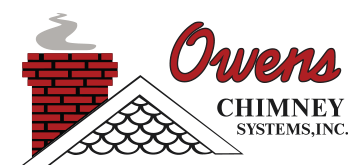Live in Charlotte or Somewhere Nearby? Consider Water Repellent for Your Chimney
Chimneys are highly exposed to the elements. Year round, these tall and mighty structures endure the blistering sun, relentless rain, biting wind, and even snowstorms that bring freeze/thaw conditions. But among all of those, a chimney’s greatest enemy is actually water. Water infiltration is a stealthy foe that creeps in through cracks, joints, and porous surfaces, wreaking havoc on your chimney’s structure and potentially endangering your health.
Left unchecked, moisture can degrade mortar joints, spall bricks and flue tiles, create the perfect breeding ground for mold and mildew, and corrode the metal components in your chimney.
The good news is water damage can be prevented with chimney waterproofing! This is a great way to add years to your chimney and help provide long-term protection! At Owens Chimney Systems, we use Chimney Saver Water Repellents™. This product comes with a 10-year warranty and has been used by chimney professionals for over 20 years.
Why Permeability Matters for Chimneys
Bricks are porous, which means they naturally absorb water. It’s important to note that while water resistance is important, complete waterproofing can also be detrimental. Therefore, you must choose a product that is specifically designed for chimneys.
The active ingredients in our Chimney Saver Water Repellents™ will create a hydrophobic barrier that will repel water from the surface in order to prevent it from soaking into the bricks, reach deep into the brick pores to provide lasting protection, all while maintaining breathability to allow moisture vapor to escape. This significantly reduces water penetration into the masonry by 99.9 percent and is also 100-percent permeable – which means it won’t trap water vapors.
Knowing the correct materials and installation techniques will not only give you peace of mind that your chimney and family are protected but also comes with some very good guarantees. Contact us today to find out more.
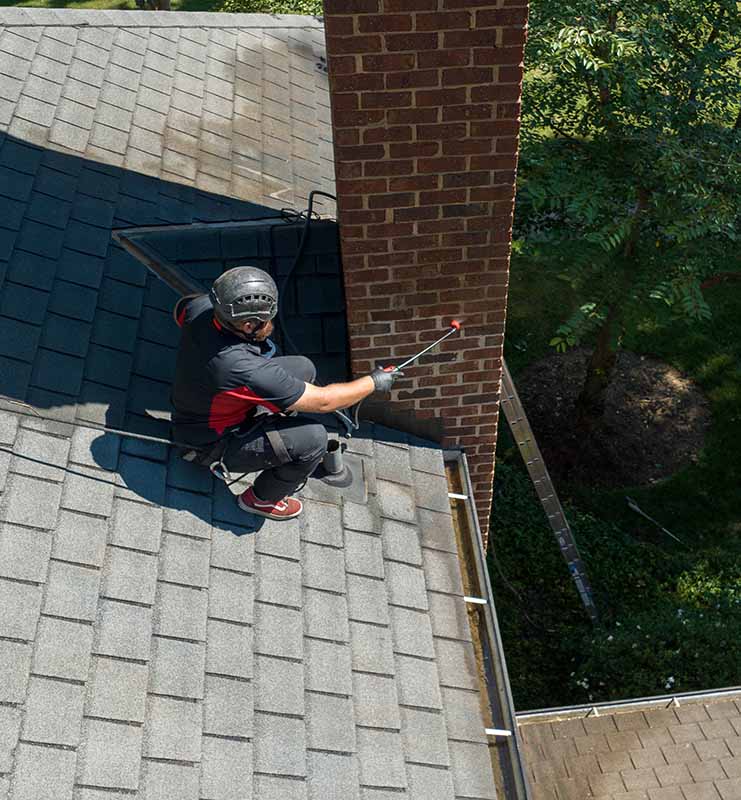
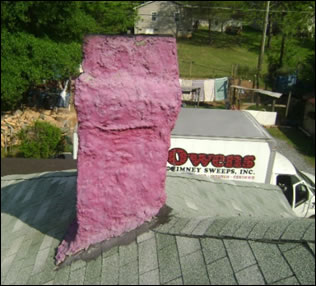
Before we tore it down.
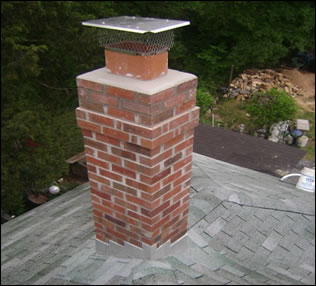
After we re-built it.
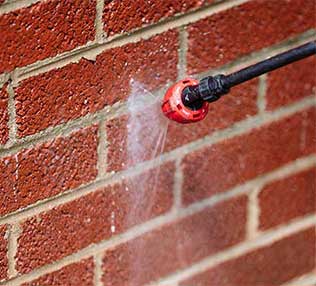
Water Repellent
Common Myths About Chimney Water Repellents
When it comes to protecting your chimney with chimney sealants, brick sealants, masonry sealants, or any other name for water repellents, there are several myths circulating that prevent homeowners from making the best decision for their chimney. Here are some of the most popular that we would like to debunk:
Myth #1: Bricks should not be waterproofed because they need to breathe.
Bricks don’t have lungs so they don’t actually need to “breathe.” However there is some truth in that bricks have tiny pores that need to release trapped moisture vapor. Traditional waterproofing can trap this vapor, causing damage. The key is using vapor-permeable chimney water repellents that repel liquid water while allowing vapor to escape.
Myth #2: My chimney doesn’t need water repellent if it has a cap.
While chimney caps serve an important purpose for helping keep out debris and rain, they’re not an impenetrable shield. Wind-driven rain can sneak under the cap, severe weather can damage it, and melting snow can still seep into the masonry. Water repellent adds an extra layer of protection to the whole chimney.
Myth #3: My chimney has been fine for many years, there’s no reason to do it now.
Think of water repellent like preventive maintenance for your car. Just because your car hasn’t broken down yet doesn’t mean you skip regular oil changes. Just like wear and tear affects your car, weather elements gradually degrade your chimney. By applying water repellent, you can prevent minor issues from turning into costly repairs in the near future.
Myth #4: I don’t need water repellent because my chimney is lined.
Flue liners protect the inside of your chimney against combustion gases and creosote. Even with a flue liner, water can still penetrate the bricks and mortar, leading to damage like spalling and efflorescence. If left untreated, this can compromise the liner’s integrity as well.
Myth #5: Water repellent is a one-time fix.
Due to weather exposure and typical wear and tear, water repellent effectiveness gradually diminishes over time. Similar to applying sunscreen in the summer to protect your skin, reapplication of water repellent to your chimney is equally as important. Depending on the product and the environmental conditions, reapplication every few years is recommended to maintain optimal protection.
Myth #6: I can just paint my chimney because that’s cheaper than water repellent.
Paint can help add a layer of protection on some things, but it’s not a waterproof solution. In fact, some paints can trap moisture within the bricks, leading to more significant damage than leaving your chimney untreated. Water repellents that are specifically designed for chimneys offer superior protection without compromising breathability.
Myth #7: Applying water repellent myself is easy and saves money.
While DIY chimney waterproofing options do exist, consider the potential pitfalls. Applying the wrong product or using improper technique can be less effective or even harmful. Working at heights can also be dangerous if you don’t have the proper safety equipment. Professionals have the expertise to choose the right product, ensure proper application, and identify any underlying issues with your chimney that might require additional attention.
How To Waterproof a Chimney
Water infiltration is a silent threat to your chimney’s health and your home’s safety. At Owens Chimney Systems, we’re here to keep your family safe and warm by ensuring your chimney is properly protected. Here’s how we do that:
- Inspection: We begin every waterproofing service with a thorough inspection. We don’t just look at the visible surface area, but also delve deeper into identifying any existing damage so that we can maximize the effectiveness of the waterproofing treatment.
- Address Underlying Issues: We don’t do band-aid fixes around here! If our inspection reveals any concerns like damaged flue liners or loose flashing, we will address these issues head-on, eliminating any other root causes of water infiltration. We want you to experience long-term protection and the only way to achieve that is by treating the root cause, not just the symptoms.
- Cleaning: A clean surface is key for optimal adhesion. When all necessary repairs have been made, we will then meticulously remove dirt, debris, and any other chimney flaw so the water repellent properly bonds with the bricks.
- Application: Simply slapping on some sealant isn’t enough. We use top-of-the-line, chimney-specific water repellents and our technicians ensure even coverage and maximum protection.
- Regular Maintenance: This is one of those instances where the “set it and forget it” approach doesn’t apply. We recommend regular chimney inspections and reapplication of repellent when necessary so your chimney remains watertight and safe for years to come.
Keep Your Chimney Dryer and Your Home Safer
Don’t gamble with your family’s safety by letting water wreak havoc on your chimney. Instead, give Owens Chimney Systems a call. We offer more than just waterproofing – we deliver comprehensive protection tailored to your specific needs, so you can be confident you will enjoy safe and cozy fires for years to come.
Don’t wait until damage strikes, call Owens Chimney Systems at 704-709-2980 or book your appointment online.
There are several ways to fix chimney leaks and our chimney restoration pros know all of them, so get in touch before things get worse!
